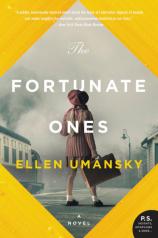Reading Group Guide
Discussion Questions
The Fortunate Ones

1. Discuss how the meaning of the painting changes or deepens as the story progresses. How does Rose initially feel about the painting, and why does she look for it after the war?
2. What does Lizzie appear to have in common with Rose? Where do they differ? Think about their first meeting, and how their relationship develops.
3. Though this story hovers around the Holocaust, the focus of the narrative draws our attention to the after-effects rather than the atrocities themselves. How does the Jewish community recover after the years of devastation? Explain how Rose grapples with her sense of guilt and loss. Do other characters deal with it differently?
4. From what you can tell, how much of the information about the painting is based on historical fact? What do you think the author invented or adapted for this story?
5. The juxtaposition of Europe in the 1930s-1940s and Los Angeles in 2006 is a stark one. How do the two narrations play against each other? Do they seem to resonate? Try to connect the situations and conflicts across this time span.
6. Do you think the dual narrative is a good way for telling this kind of story? Why or why not? Can you think of other novels or films that use the same strategy?
7. Joseph’s death and the search for the stolen painting brings Lizzie and Rose together. In what other ways are these characters are drawn toward each other?
8. When Rose is a student in London, she feels a strong affinity for the work of Dostoyevsky, who writes that “one reptile will devour another.” On page 158, Rose explains that this quote refers to the irrational side of the human soul, where all humans harbor dark, murderous impulses. She admits that she finds this “ugliness of the human condition” to be comforting, and that it makes her feel “understood.” What do you make of Rose’s ideas here? Why do you think Rose finds solace in thinking about the nature of evil?
9. On page 104, Lizzie asks whether Rose ever sought reparations from the government for the loss and suffering her family experienced during Holocaust. Rose refuses, saying “I don’t want that money, it’s blood money. It makes what happened about property, and it most certainly is not. Besides, I’m not the victim here; my parents are.” Think about how Rose’s refusal to seek compensation for her suffering, and then about her desire to recover the stolen painting. What is valuable to Rose? Can we see the painting as a “reparation”? Why or why not?
10. After Germany annexed Austria in 1938, life for Jews became even more restricted and difficult. Rose’s father loses his business, the children aren’t allowed to go to school or even to the movie theater, and most strikingly, the family has trouble securing travel documents. Can you name any other restrictions that the government imposed on Jews during the earlier stages of the Holocaust? Can you talk about other ways people tried to flee Nazi Germany and enter other countries?
11. How might Rose’s experience fleeing from her home country resonate with current events? What are some parallels between her situation and the current refugee crisis in Europe?
12. The author never describes what actually happened to Rose’s parents. What do you make of her decision to omit these details from the story? What do you think happened to them? What does Rose think?
13. Look up The Bellhop by Chaim Soutine. Does the painting appear like its descriptions in the story? Is it what you expected? How does looking at the original painting change the way you think about the characters’ attachments to it?
14. Discuss the story’s ending. Are you surprised by Rose’s reaction to the discovery of the painting? Was this satisfying or frustrating for you?
15. People deal with grief and trauma in different ways. Discuss Rose and Gerard’s alternate responses to being separated from each other, relocated from their native country, and losing their parents. How does Gerard cope differently from his sister? How do their experiences compare with the way that Lizzie handles grief?
The Fortunate Ones
- Publication Date: November 21, 2017
- Genres: Fiction
- Paperback: 352 pages
- Publisher: William Morrow Paperbacks
- ISBN-10: 0062382497
- ISBN-13: 9780062382498







